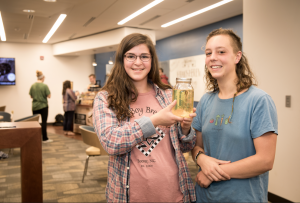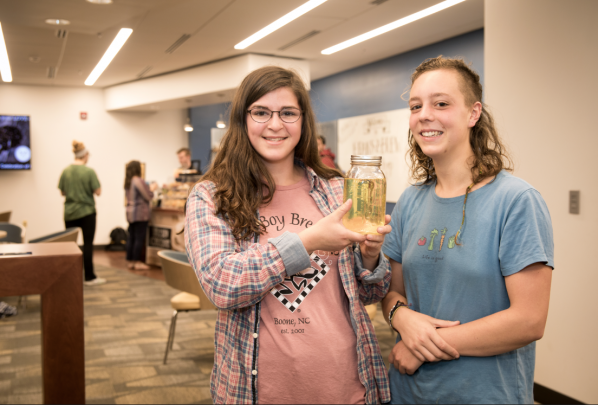ASU NEWS—What has 18 wheels and runs on corn chips? Thanks to a food solution from two Appalachian State University students, a chip producer’s transportation fleet well could.
Senior chemistry major and sustainable business minor Kelsey Simon and senior management major and nutrition and sustainable business minor Ali Moxley placed second in the international Food Solutions Challenge, held during the Global Food Solutions Conference April 19-21 at the University of Wisconsin-Madison.
Their food solution converts used frying oil from corn chip production to biodiesel to fuel a chip company's transportation fleet. The Food Solutions Challenge is designed to raise awareness and holistic thinking around issues stemming from food production and distribution with a goal of making the food supply chain more carbon neutral.
Appalachian was one of six finalists in the competition, which began as a field of 50. The other finalists were McGill University in Quebec, Canada, University of California Berkeley, California College of the Arts, Texas State University and the DC Net Impact professionals chapter.
During the event, the students presented the winning solution originally submitted during the local challenge event March 8 in Peacock Hall on the Appalachian campus. The six winning submissions from the local events earned the finalists an all-expense-paid trip to the Wisconsin conference.
Related: Local Food Solutions Challenge held March 8
"We were excited to travel, compete and represent the Walker College of Business in the international event," said Kernersville native Simon, who is president of Appalachian's chapter of Net Impact, a professional network that supports and promotes sustainable business practices. "Presenting our food solution was a great experience."
Simon credited Moxley, from Marietta, Georgia, with the food solution idea. For their work, the students earned a $1,000 prize for Appalachian’s Net Impact Club.
About Sustainable Business at Appalachian
Appalachian’s Walker College of Business is committed to advancing sustainable business practices that promote responsible management of economic, social and natural resources. The theory and practice of sustainable business recognizes that the economy, environment and society (the triple bottom line) are interconnected and interdependent, and strives to enhance the business model so that it can flourish and thrive to benefit future generations. The college offers a sustainable business minor available to business and non-business majors, a bachelor’s degree in environmental economics and policy, and an MBA concentration in sustainable business. The programs focus on student engagement, research and community involvement.
About Net Impact
Net Impact is a community of more than 100,000 students and young professionals who want to transform their passions into world-changing action. A nonprofit membership organization, Net Impact empowers its members to use business skills in support of various social and environmental causes. Programs and networking events center on topics such as corporate social responsibility, social entrepreneurship, nonprofit management, international development and environmental sustainability.
About Appalachian State University
Appalachian State University, in North Carolina's Blue Ridge Mountains, prepares students to lead purposeful lives as global citizens who understand and engage their responsibilities in creating a sustainable future for all. The transformational Appalachian experience promotes a spirit of inclusion that brings people together in inspiring ways to acquire and create knowledge, to grow holistically, to act with passion and determination, and embrace diversity and difference. As one of 17 campuses in the University of North Carolina system, Appalachian enrolls about 18,000 students, has a low student-to-faculty ratio and offers more than 150 undergraduate and graduate majors.


